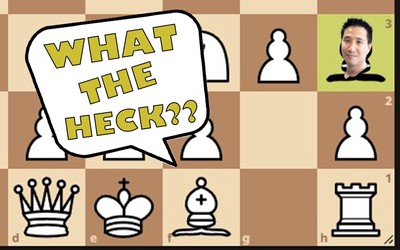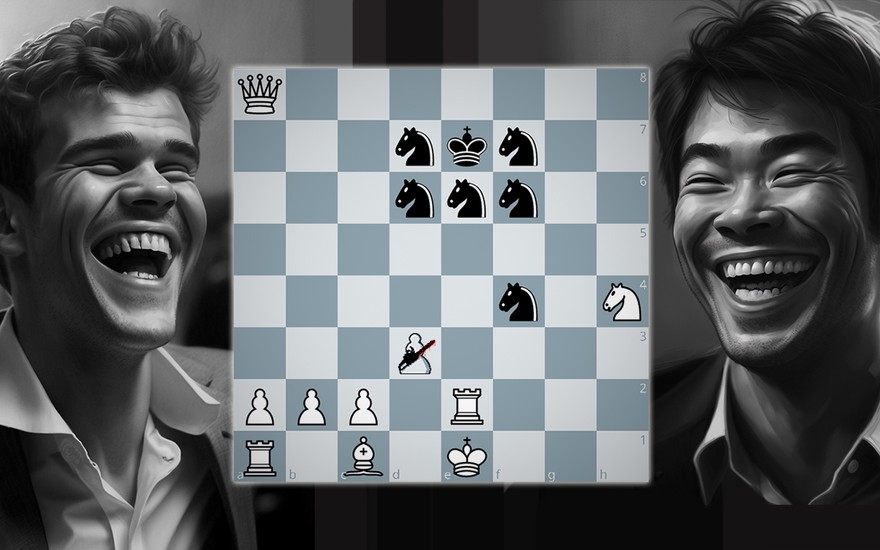
Bullet Chess Championship 2023 - A review by DonnieDarkcore
What can normal bullet chess players learn from the elite?Bullet Chess Championship 2023
This year's bullet chess championship 2023 mustered up all the best bullet players, and chess.com has all the games available for download. Here is the link -> download all bullet chess championship games
Nakamura won once again against Magnus Carlsen, in an unbelievably exciting final!
Bullet Chess Championship Info on chess.com
I downloaded the .pgn, opened it in ChessBase, started researching, and was surprised so many times, that it was worth an article.
Here's what I found:
Elite opening choices:
In over 555 played games, these are the interesting results: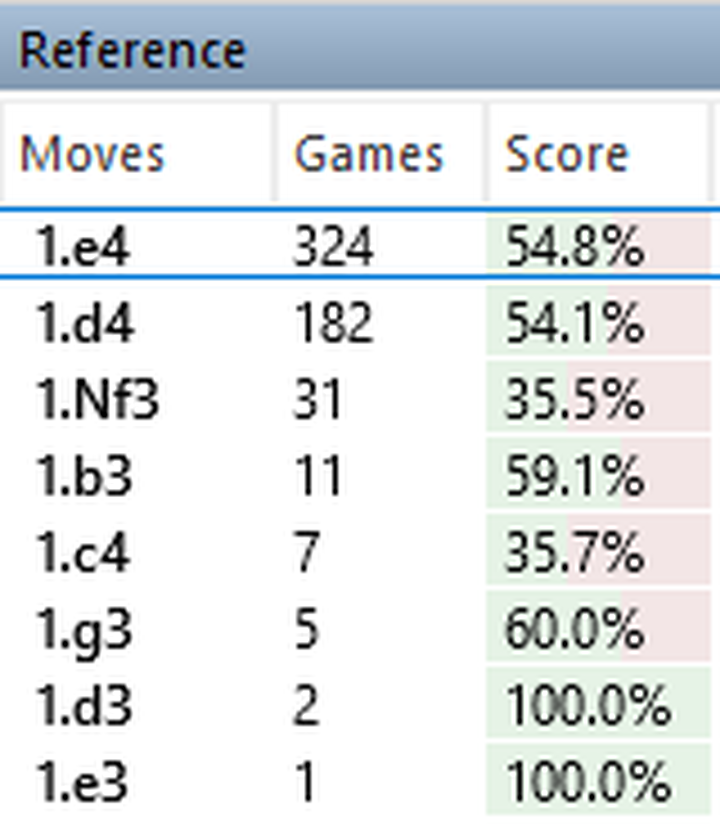
- 1. e4 was dominating with 324 games.
- 1. d4 only had 182 games.
- 1. Nf3 was played 31 times, mostly by Hansen, and Nakamura. (8x and 7x)
- Other openings were 1. b3 (11x), 1. c4 (6x by Naroditsky, and 1x by Carlsen with awful results), 1. g3 (5x), 1.d3 (2x, and probably both were mouse slips, but both were also won) and one time 1.e3 by Nakamura, who also won this game.
1.e4
The most played opening setup was the Four Knights Game. (47 times)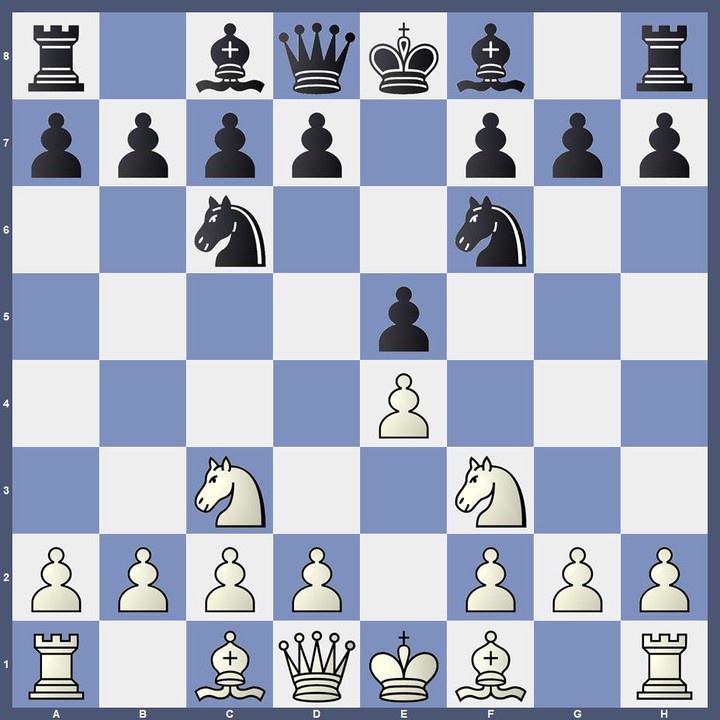
Especially Andreikin vs. Paravyan, and Carlsen vs. Firouzja (both 9 times) chose the 4 knight setup.
53,3% White won.
Surprisingly, it was played more often than the Ruy Lopez! (Only 29 times)
With a White win rate of just 43,1%, the Spanish Opening seems to be a rather bad bullet opening choice.
125 opponents responded with 1. e4 e5
The Sicilian Defence was an unpopular bullet response! 1. e4 c5 was only played 50x, with a win rate of just 39% for Black.
The Alekhine Defence grew in bullet popularity, thanks to Bortnyk (19x), and Naroditsky (10x)!
38 games were played, and White had a slight advantage with a 55.3% win rate.
The Modern Defence seems to be the best answer for Black against 1. e4! It was on the board 33x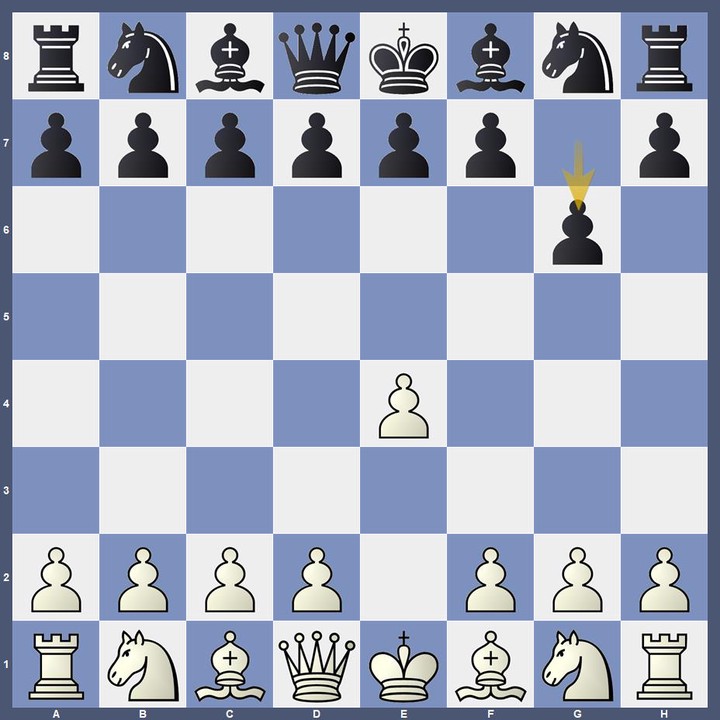
But the main reason for this is, that it's one of Nakamura's favourite Bullet openings.
In 23 games, the Bullet Champion won 11x, and only lost 5x (4x against Carlsen in the Final)
But also the former World Champion from Norway, and Naroditsky, have positive results as Black.
White won 39.4%
Caro-Kann Defence (16x), and French Defence (21x) were less played than the Scandinavian Defence (29x)
While Minh Le (12x), Alcantara (9x), and Carlsen (8x) prefer 1. e4 d5, as Black, Tang (10x) is more a fan of 1. e4 e6, (With great results against Carlsen, Hansen, and Alcantara - by the way), and 1. e4 c6 was only played by Carlsen (8x), Firouzja, and Nakamura (both 4x)
Nakamura loves the Pirc Defence, too. 1. e4 d6 was played by him 10x (Hansen played it 2x)
The results for this opening are 50%
1. d4
In 182 games with 1. d4, the overwhelming answer was 1. .. Nf6
The Indian Defence was played 121x!
One of the most popular continuations (29x) was the West Indian Variation (Also known as the King's Indian Defence)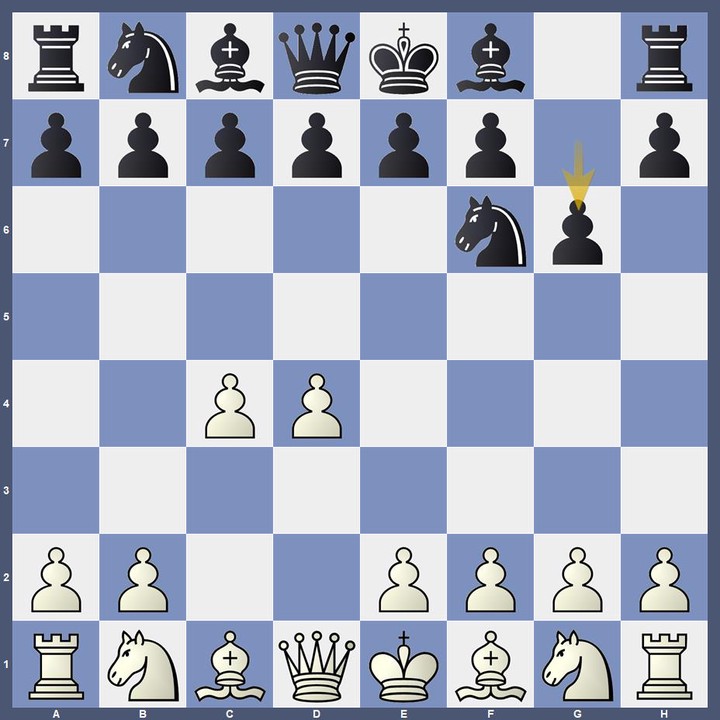
Alcantara (11x), Firouzja (9x), and Caruana (5x) enjoyed this position as Black with good results! White only won 48.3%
If the Elite didn't choose to continue with 2. c4, they often continued with 2. Nc3 (33x)
While the normal "London System" was only played merely 5x, the Jobava London System was on the board a stunning 18x, and won 66.7% of the games for White!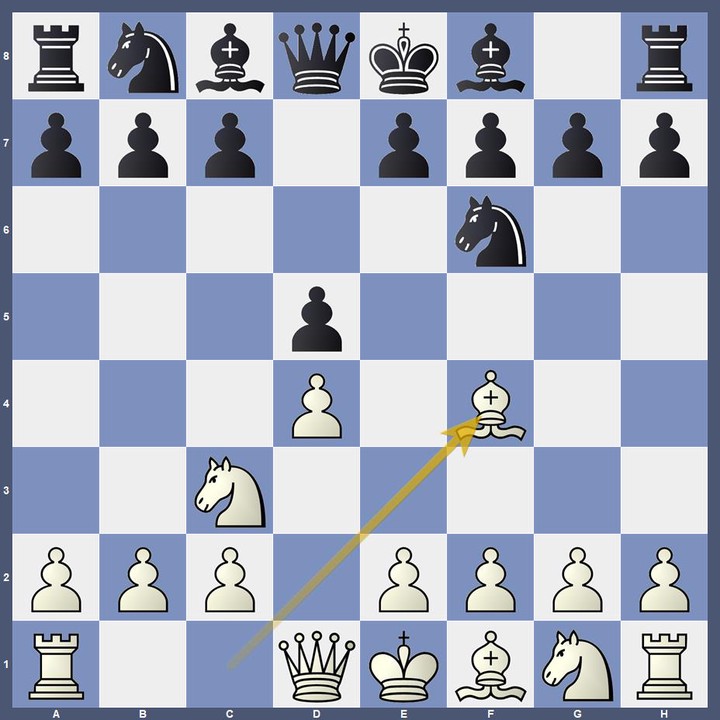
Bortnyk (8x), Naroditsky (5x), and Firouzja (4x) had great fun with the setup. (Even Carlsen won 1x)
Whoever dared to answer 1.d4 with d5 was often blown away by White with a win rate of 62%
Instead of 2. c4, White continued more often with 2. Nf3
Imagine, only 6 played games were a true Queen's Gambit!
But just ONE game was won by Black (Hansen vs. Carlsen 0:1)
One more 1. d4 related thing - The Rat Defence was played 5x between Tang vs. Naroditsky, and the result was 0.5 to 4.5. A new secret bullet weapon? Probably not.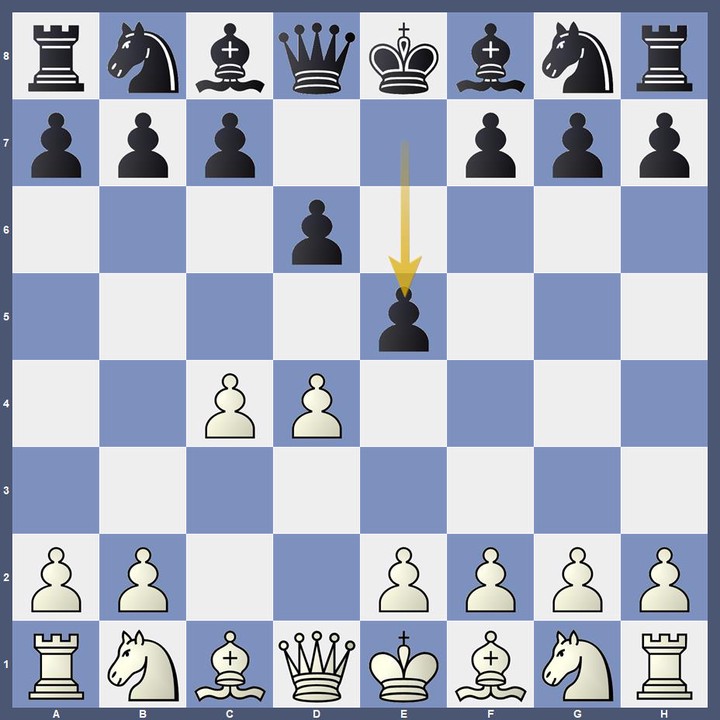
1. The Rest
Nakamura and Carlsen, love to play fianchetto's in bullet!
The two championship finalists, played 1.b3, 1.g3 aswell as 1. .. b6, 1. .. g6 over 70 times, which was more than all other players in %!
Carlsen tried the King's Gambit 1. e4 e5 2. f4 for 3x against Tang, and won two of the games.
Tang, who also enjoys experimental openings, had a triple success with 1. d4 Nf6 2. g4?!, the so-called Bronstein Gambit.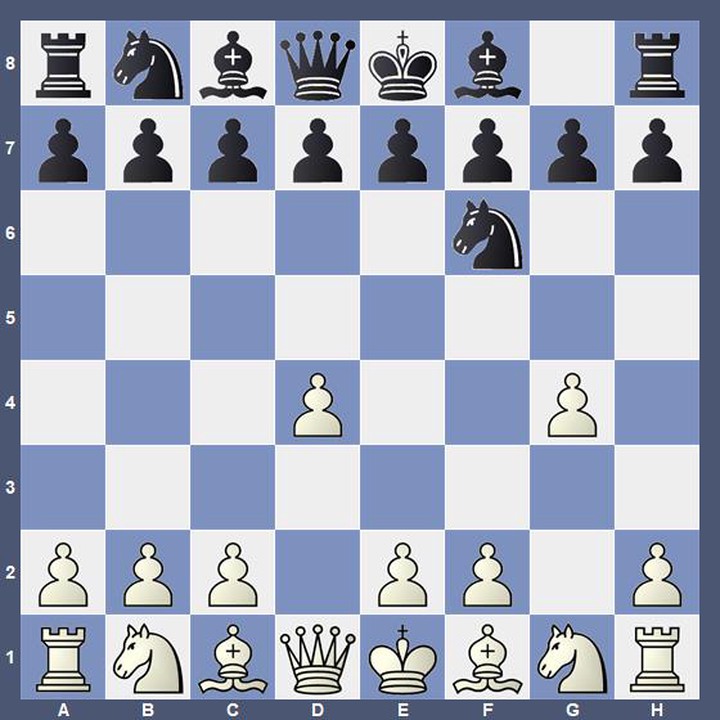
Furthermore, Nakamura had fun with the Portuguese Variation of the Scandinavian 1. e4 d5 2. Nc3, and won three of the six played games against Alcantara, and Carlsen.
Was there a "Lefong"? Well, there was a brave attempt by Ohanyan vs. Nakamura.
Tang, the fastest participant, pulled off a beautiful queen trap against Hansen:
And it is up to debate if Naroditsky knew the theory well enough, or tricked Tang:
The Beauties
All commentators did a fantastic job of covering the quick action! Robert Hess, and his partners had fun, were professional, and entertaining the whole time, which is a mammoth task.
It was a brave decision to add Simon Williams to the setup, since he is not the greatest bullet fan, but on the other hand, you can add the GingerGM to any chess event, and it will be great.
Sometimes, the hosts were screaming in disbelief, when players missed a tactic, or made an incredible move.
In split seconds, ChessBase found the "beauties" of all played games, and it aligned with the commentators reactions very well.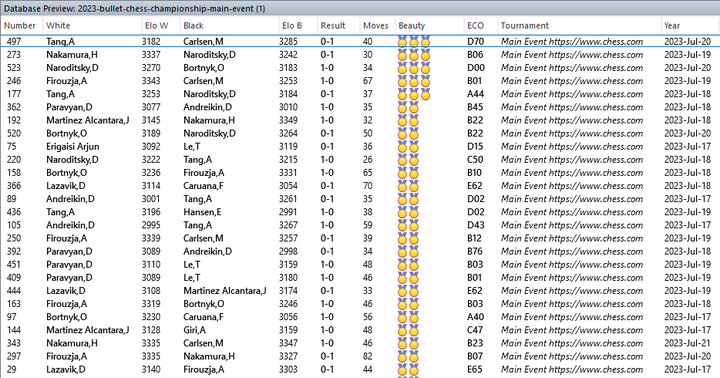
With just seconds left on the clock, Carlsen found the only winning move 39. .. Rh1+ to seal the deal against Tang:
Naroditsky's best game of the tournament, was played against Nakamura. Daniel had the audacity to sacrifice two minor pieces against the Bullet Champion (though the second sacrifice was a mistake), and end the game with a crushing mate attack:
And Naroditsky also played an outstanding game against Tang, with sacrifices on both sides, and a fearsome combination to win for Black:
Tang pulled off one of the most stunning checkmate combinations of the tournament. He sacrificed his queen against Andreikin, which was the ONLY winning move, to open up a square for his knight, and end the game:
One of the most decisive games in the tournament, was the one between Carlsen and Nakamura. The critical move, was the queen sacrifice by Carlsen. Was it on purpose? Did it actually work?
In move 37, Carlsen can simply move his queen to f7, and the engine points out, that Black has -10. Instead, the former World Champion took the pawn on d3 with his bishop, which is still good for Black, but can cause trouble.
Nakamura rightfully took the queen, but this was the most important moment of the game. Instead of taking back the rook immediately, Carlsen had to play Ne2+!!
Also, Nakamura spotted the next best move with N3xd4!!, to give his King enough Luft, and turn the game around. What a spectacle:
The Players
As I pointed out in my Ultimate Bullet Chess Course, there are four pillars to become a bullet chess master:
- Chess Knowledge 40%
- Tactics 30%
- Speed 20%
- Bullet Expertise 10%
BUT, after reviewing the whole event, one pillar might be missing!
5. Emotional Psychology
Why is Nakamura better than Carlsen, Naroditsky, Firouzja, Tang, and all the other bullet monsters? I think, it is the opponents' awareness, that Nakamura ALWAYS has tricks up his sleeve, and can build up threats better than any other player in the field. They pointed this out in their interviews as well.
When getting a better position against Nakamura, the game is far from over. It is actually a huge battle against the own psychological fear of making one tiny mistake and getting punished by him.
This little voice in your head plays a significant role in tournaments, time scrambles, and obviously, chess.
Furthermore, Nakamura is using the rules of the tournament to his favour perfectly. Waiting until the time is running out, before making a final move, was used by him in the earlier tournaments as well.
While I am touching plenty of psychological actions in my bullet chess course, emotions are a big, big thing in bullet. If you lose a game, it is often more difficult to win the next game.
I created a playful Top Trump Card Game with the first six tournament players. Please point out, if you disagree with the stats from 1-100 for any player:
Hikaru Nakamura:
- Chess Knowledge - 96
- Tactics - 99
- Speed - 98
- Bullet Expertise - 100
- Emotional Psychology - 99
Total Bullet Power - 492
Magnus Carlsen:
- Chess Knowledge - 100
- Tactics - 99
- Speed - 94
- Bullet Expertise - 94
- Emotional Psychology - 98
Total Bullet Power - 485
Alireza Firouzja:
- Chess Knowledge - 98
- Tactics - 99
- Speed - 96
- Bullet Expertise - 95
- Emotional Psychology - 90
Total Bullet Power - 478
Daniel Naroditsky:
- Chess Knowledge - 92
- Tactics - 98
- Speed - 98
- Bullet Expertise - 100
- Emotional Psychology - 92
Total Bullet Power - 480
Andrew Tang:
- Chess Knowledge - 91
- Tactics - 98
- Speed - 100
- Bullet Expertise - 100
- Emotional Psychology - 88
Total Bullet Power - 477
Alexander Bortnyk:
- Chess Knowledge - 90
- Tactics - 96
- Speed - 98
- Bullet Expertise - 99
- Emotional Psychology - 91
Total Bullet Power - 474
Conclusion:
So, what can normal bullet chess players like you, and me, learn from the Elite?
This still remains true:
- Chess Knowledge 40%
- Tactics 30%
- Speed 20%
- Bullet Expertise 10%
Although speed was important, tactics, king safety, stunning attacks, and great defence were the main characters. More games ended in a checkmate, draw, or resign, than losing on time.
Furthermore, players with a great bullet expertise, knew what to play in difficult, bullet typical situations, and won like this. Sometimes, Carlsen had to suffer because of this. (If he would just watch my course, he would be Number 1!!! ;) )
What is very interesting though, is the emotional psychology, and how important it is in a tournament, not by just trying to play some fun games, or try to gain a higher rating.
Tournaments, and the time pressure, which wasn't only present in the games, were one of the most important factors, and maybe the reason, why Nakamura is the best bullet chess player in the world.
What do you think?
On my YouTube channel, I made some interviews with some great bullet players. It would mean a lot to me, if you subscribe to my channel, but no pressure. Cheers.
https://www.youtube.com/watch?v=SeuxPyfi1uw
More blog posts by DonnieDarkcore
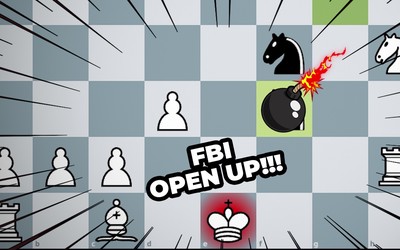
What if a piece could only be captured, when attacked twice!
An interesting new chess variant?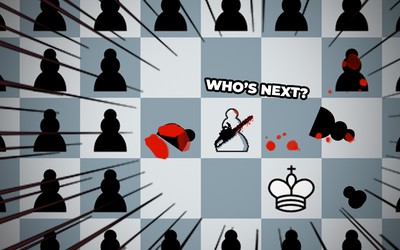
How to play as a Zombie army against a friend on lichess in 5 steps!
This is a lichess board editor tutorial on how to play a fantasy setup with a friend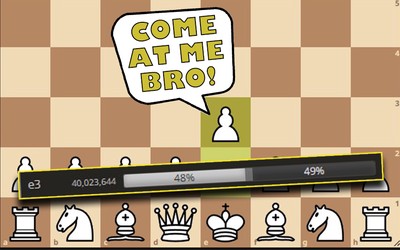
40,000,000 times people play 1.e3 ... BUT WHY???
A guide to the cheapest and nastiest bullet chess openings